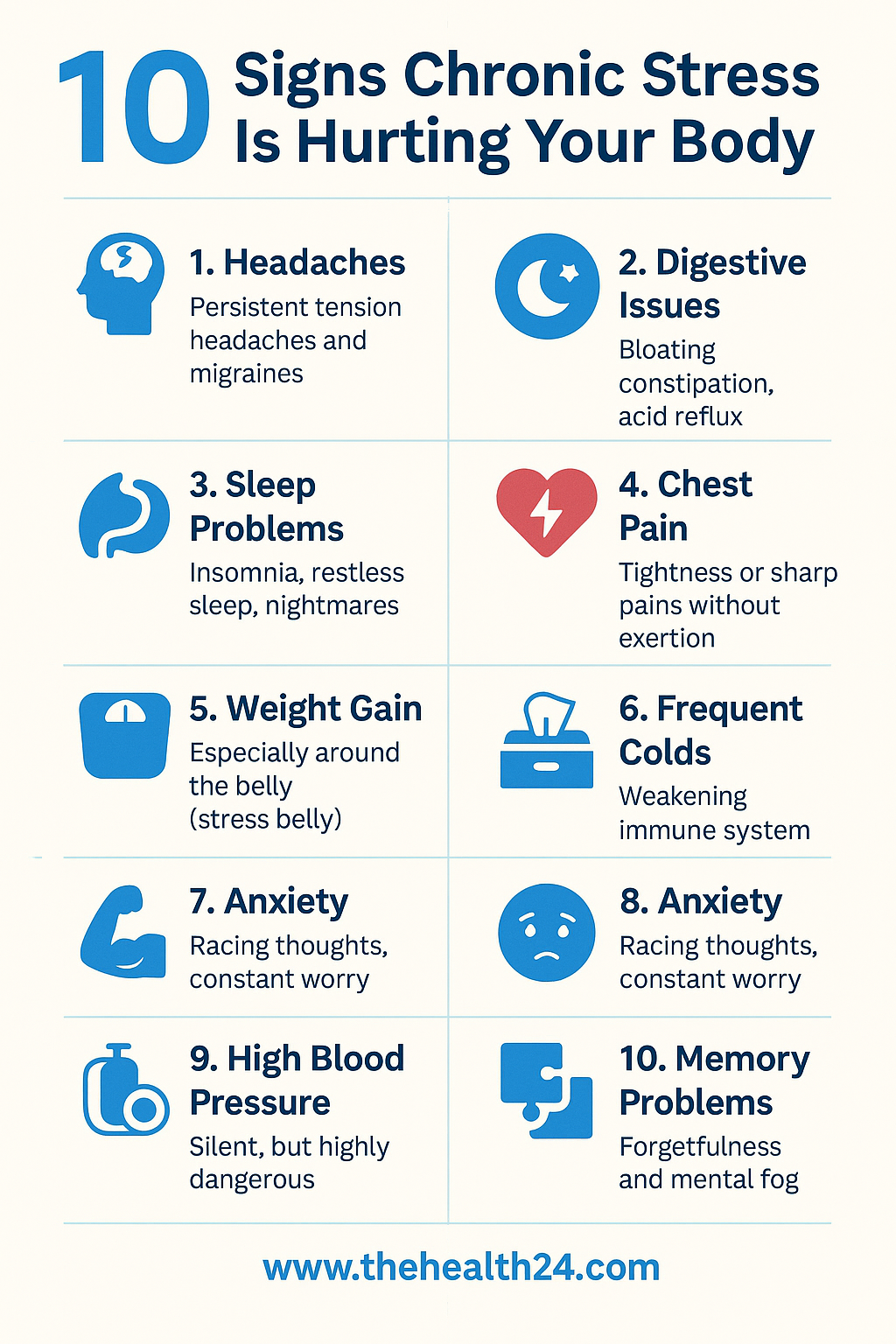Chronic Stress and Physical Health: In today’s fast-paced world, chronic stress isn’t just an emotional struggle — it’s a bigger problem which is even impacting you inside your body.
Stress can stem from work-related issues like workload, job insecurity, workplace conflicts or also from personal relationships, including love or romantic relationships. The constant, unrelenting pressure of modern life is wreaking havoc on our health in ways we can no longer ignore.
Here’s the truth: Stress is no longer just “in your head” — it’s in your heart, your gut, your hormones, and your immune system.
The good news? You have more power than you think.
Let’s read how chronic stress damages your body and, more importantly, how you can start healing today.
1. Stress: The Body’s Ancient Survival System
Stress activates your fight-or-flight response — a survival mechanism designed to keep you alive in life-threatening situations.
When your brain senses danger, it floods your system with adrenaline and cortisol, sharpening your senses and powering your muscles for action.
Problem: Your body doesn’t know the difference between real danger and daily life frustrations.
When the stress response stays “on” too long, it starts hurting you from the inside out.
📚 Source: Harvard Health Publishing – Understanding the Stress Response
2. The Physical Symptoms You Shouldn’t Ignore
Stress doesn’t stay locked in your mind — it invades your body.
Here’s how it physically shows up:
- Headaches and Migraines
- Digestive issues (like bloating, acid reflux, constipation)
- Muscle tension, neck and back pain
- Chest pain and racing heartbeat
- Sleep disturbances (trouble falling or staying asleep)
Left untreated, these are early warning signs that your body is under siege.
📚 Source: Mayo Clinic – Stress Symptoms: Effects on Your Body and Behavior

3. The Dangerous Hormonal Storm Inside You
Under chronic stress, your adrenal glands pump out excess cortisol — and that’s when the real trouble begins.
🔹 Weight gain (especially around the abdomen)
🔹 Weakened immune system (more colds, longer healing time)
🔹 Hormonal imbalances (affecting menstrual cycles, libido, fertility)
🔹 Increased blood sugar (risk of insulin resistance and diabetes)
Brain impact:
High cortisol levels over time can shrink the hippocampus, the part of your brain responsible for memory and learning.
📚 Source: NIH – Chronic Stress Puts Your Health at Risk
4. Work Stress: Why Your Job Could Be Killing You Slowly
Deadlines, micromanagement, toxic office politics — sound familiar?
Chronic workplace stress leads to:
- Burnout
- Anxiety and depression
- Increased risk of heart disease and stroke
In fact, according to a study by the World Health Organisation, burnout from work stress is now officially recognized as an occupational phenomenon impacting health worldwide.
📚 Source: WHO – Burn-out an “occupational phenomenon”
Important: Remote workers are not immune — “always-on” culture can be even worse without boundaries.
5. From Anxiety to Heart Attacks: Stress’s Deadly Chain Reaction
When stress floods your body, it doesn’t just make you anxious — it actually injures your heart.
🔸 Elevated blood pressure
🔸 Damaged arteries
🔸 Chronic inflammation
🔸 Plaque buildup in blood vessels
This creates a perfect storm for heart attacks, strokes, and even sudden cardiac death.
Interestingly, women’s hearts react differently to stress, making them vulnerable to “Broken Heart Syndrome” — a temporary heart condition triggered by extreme emotional stress.
📚 Source: Johns Hopkins Medicine – Stress Cardiomyopathy (Broken Heart Syndrome)

6. Stress Management Isn’t a Luxury — It’s Survival
You can’t always avoid stress.
But you can master how you respond.
Here are simple, powerful ways to reset your nervous system daily:
💨 Deep Breathing: Try the 4-7-8 technique — inhale 4 seconds, hold 7, exhale 8.
🧘♂️ Mindfulness & Meditation: Even 5 minutes a day can lower cortisol dramatically.
✍️ Gratitude Journaling: Write down 3 things you’re grateful for every morning.
🚶 Movement: Walk, dance, stretch — move the stress out of your body.
🎯 Structured Breaks: Use the Pomodoro technique — 25 minutes focus, 5 minutes relax.
Consistency beats intensity. Small daily steps protect you over time.
7. Stress Prevention: Building a Life That Protects You
✅ Set Boundaries: Learn to say no — your health depends on it.
✅ Prioritise Sleep: Aim for 7–9 hours; it’s your body’s repair mode.
✅ Nurture Good Relationships: Spend time with people who uplift you, not drain you.
✅ Healthy Nutrition: Your gut microbiome affects your brain.
✅ Disconnect to Reconnect: Schedule screen-free time every day.
Remember:
“Self-care is not selfish. It’s survival.”
Chronic stress maybe a silent killer — but it doesn’t have to control your life.
Every time you pause, breathe, set a boundary, or choose rest, you’re literally rewiring your brain and healing your body.
You deserve a life where peace isn’t just a moment — it’s your foundation.
Take your first step today: Choose one small stress-reducing habit and commit to it. Your future self will thank you.
Written by:
Gratitude Healthcare Team – Guiding you towards a healthier, happier life.
Visit Us for More Health Insights ➔ www.gratitudehealthcare.in
Disclaimer
The information provided in this article is for general information purposes only and does not constitute any medical advice. No claims or recommendations mentioned in above article should be taken accepted without checking with your doctor. Always consult with a qualified healthcare professional or your doctor for starting any supplement & diagnosing or treating any medical or health related conditions .

